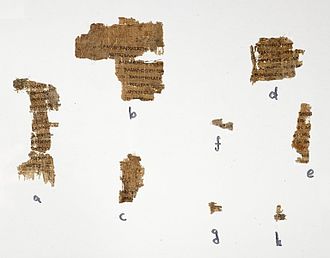
 |
Freethought & Rationalism ArchiveThe archives are read only. |
|
|||||||
|
|
Thread Tools | Search this Thread |
|
|
#11 | ||
|
Veteran Member
Join Date: Oct 2007
Location: Chicago Metro
Posts: 1,259
|
Quote:
Regards, Sarai |
||
|
|
|
|
#12 | |||
|
Contributor
Join Date: Mar 2006
Location: Falls Creek, Oz.
Posts: 11,192
|
Quote:
This is an exceedingly fragmented papyri fragment.  Here's what WIKI says - I have bolded the last paragraph: Quote:
Quote:
There is a bit to digest here. I imagine that there must be other papyri from the Greek LXX also dated before Origen in the 3rd century, and I would like to have a look at a few more when I get the chance. But this is a good start. I would like to examine more evidence before returning to Papyrus_Rylands_458 and its paleographical dating to before 100 BCE. Best wishes Pete |
|||
|
|
|
|
#13 | |
|
Contributor
Join Date: Mar 2006
Location: Falls Creek, Oz.
Posts: 11,192
|
Quote:
My question is about independent evidence for the physical appearance of the Greek LXX in antiquity. One further thing is that AFAIK the "Christian Greek LXX" and the "Greek LXX" are supposedly able to be differentiated on the basis that the former employs an array of "nomina sacra" codes similar to those found in the new testament. |
|
|
|
|
|
#14 | ||
|
Contributor
Join Date: Mar 2006
Location: Falls Creek, Oz.
Posts: 11,192
|
Quote:
According to the sources mentioned here, this strong match is actually physically cited by Eusebius from the 4th century. Additionally, is the source Aristeas the same one from Josephus, or independent? Anyway, many thanks for digging this stuff out of textcavation. There is also a primary reference in Eusebius's History. He wastes no time as he introduces the highly regarded Platonist Anatolius as the Christian Bishop of Laodicea, by having his source support Josephus's account of "The Letter of Aristeas", and a BCE chronology for the first Greek LXX . Quote:
|
||
|
|
|
|
#15 | |
|
Contributor
Join Date: Mar 2006
Location: Falls Creek, Oz.
Posts: 11,192
|
Quote:
That was news to me. I was not aware of Greek LXX fragments amidst the DSS. Any online articles? |
|
|
|
|
|
#16 | ||
|
Junior Member
Join Date: May 2011
Location: Perth
Posts: 57
|
Quote:
Quote:
|
||
|
|
|
|
#17 |
|
Junior Member
Join Date: May 2011
Location: Perth
Posts: 57
|
I hadn't realised there are Christians who are so disturbed by Paul and Jesus quoting the LXX that they try to reverse the order of dependence (link).
The same people seem to be tied in with the KJV-only crowd, which is hilarious because of the preface to the 1611 KJV (link). [I]t pleased the Lord to stir up the spirit of a Greek Prince (Greek for descent and language) even of Ptolemy Philadelph King of Egypt, to procure the translating of the Book of God out of Hebrew into Greek. This is the translation of the Seventy Interpreters, commonly so called, which prepared the way for our Saviour among the Gentiles by written preaching, as Saint John Baptist did among the Jews by vocal.Hahaha. Ha. |
|
|
|
|
#18 | ||
|
Veteran Member
Join Date: Oct 2007
Location: Chicago Metro
Posts: 1,259
|
Quote:
San Diego Natural History Museum DDS Exhibit Dead Sea Scrolls Foundation There weren't a lot of Greek MSS fragments found in comparison to the Hebrew & Aramaic. If I recall correctly there were 4 or so in Cave 4 and 19 in Cave 7. Cave 4 had the remains of 2 scrolls of Leviticus, 1 of Numbers, and 1 of Deuteronomy. Cave 7 had tiny remains of which they ID'ed a fragment as Exodus 28:4-7 and the letter of Jeremiah, verses 43-4. There's probably more available out there on the net about the Greek texts, but I don't have time to go through them all. Hopefully, this will give you a bit of a start. Regards, Sarai |
||
|
|
|
|
#20 | |||
|
Veteran Member
Join Date: Dec 2008
Location: Hillsborough, NJ
Posts: 3,551
|
Quote:
The are many places in the bible where YHWH Adonai or Adonai YHWH is found. This is vocalized as Adonai Elohim. http://www.jewishencyclopedia.com/vi...ch=adonai yhwh Quote:
My hunch is that the name was pronounced like it's spelled... Yahweh. |
|||
|
|
| Thread Tools | Search this Thread |
|